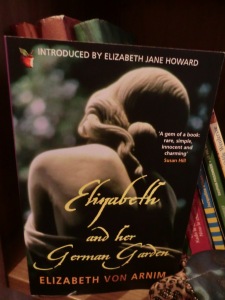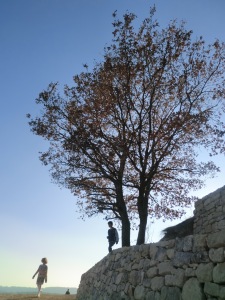 Staying overnight with friends in England just before Christmas, this book by Elizabeth von Arnim was placed on my bedside table and though there was no chance I would finish it, I was captivated and charmed by Elizabeth’s garden right from those first few pages.
Staying overnight with friends in England just before Christmas, this book by Elizabeth von Arnim was placed on my bedside table and though there was no chance I would finish it, I was captivated and charmed by Elizabeth’s garden right from those first few pages.
May 7th – I love my garden. I am writing in it now in the late afternoon loveliness, much interrupted by the mosquitoes and the temptation to look at all the glories of the new green leaves washed half an hour ago in a cold shower. Two owls are perched near me, and are carrying on a long conversation that I enjoy as much as any warbling of nightingales. The gentleman owl says
, and she answers from her tree a little way off,
, beautifully assenting to and completing her lord’s remark, as becomes a properly constructed German she-owl. They say the same thing over and over again so emphatically that I think it must be something nasty about me; but I shall not let myself become frightened away by the sarcasm of owls.
I left without the book, only for it to land on my doorstep late January on my birthday, and in these cold harsh months when the comforts of a garden are not so easy to find, when I have been finding solace instead in the nature essays of Kathleen Jamie and the short stories of Tove Jansson (review to come), this novel was a welcome respite.
It is fiction, though reads very much like an autobiography and was initially published anonymously in 1898. The author (a cousin of Katherine Mansfield) is said to have been born in Sydney, in NZ and in England, I’m not sure about any of that, but her parents did leave Sydney and return to England where she was raised (while her father’s brother and family remained in New Zealand).
It seems likely that Katherine Mansfield spent time with these relations when she moved to England herself, I found one reference confirming this, a comment by the journalist (and relation of the two) Louise Ahearn, who is currently researching Elizabeth’s life and it is mentioned in the book that Katherine visited her cousin at the home she built Chateau Soleil, in Switzerland.
On a tour of Europe, while in Rome with her father when she was 23-years-old, her talented piano playing was overheard by Il Conte the German Graf Henning August von-Armin-Schlagenthin, who was travelling to help get over the death of his wife and child the previous year. After a persistent courtship they were married and soon settled into upper-class life in Berlin, where she gave birth to three girls in quick succession.
Not happy in Berlin and homesick for England, in 1896 she was introduced to the family estate Nassenheide, ninety miles north of Berlin in Pomerania. A seventeenth century-schloss, located at the time near the German border (now in Poland), it had been a convent and had not been lived in for more than 25 years, surrounded by an unkempt, rambling, derelict garden which Elizabeth immediately fell in love with. She insisted on living there and it seems she got her way (at least for the summer months), much to the chagrin of her husband, whom she affectionately refers to in the novel as the Man of Wrath.
The book captures many moments of appreciation of this unorthodox wilderness the character Elizabeth is so content within, and equal moments of candour at the annoyance of those who dare impose themselves to visit. She has difficulty keeping the gardener who often hands in his notice while she somehow convinces him to stay, until events dictate that drastic action is necessary to get rid of him.
The gardener has been here a year and has given me notice regularly on the first of every month, but up to now has been induced to stay on. On the first of this month he came as usual, and with determination written on every feature told me he intended to go in June, and that nothing should alter his decision. I don’t think he knows much about gardening, but he can at least dig and water, and some of the plants he plants grow, besides which he is the most unflaggingly industrious person I ever saw, and has the great merit of never appearing to take the faintest interest in what we do in the garden. So I have tried to keep him on, not knowing what the next one may be like, and when I asked him what he had to complain of and he replied “Nothing,” I could only conclude that he has a personal objection to me because of my eccentric preference for plants in groups rather than plants in lines. Perhaps, too, he does not like the extracts from gardening books I read to him sometimes when he is planting or sowing something new.
The author is at her best when describing her longing for the garden and the simple pleasure it brings her, though equally adept are her recounts of conversations with city ladies of her social standing, capturing their inability to comprehend that it is by her own choice that she spends so much time in this savage wilderness, they are convinced they must feel sorry for her and that she has been deposed there, belonging as they do to that breed of women who absolutely require the regular company of their peers and the invitations to social occasions, something Elizabeth does her best to avoid.
Content with the book, inspired by but lacking the garden, we instead take a drive and a stroll around a much closer abandoned ruin, appreciating its beauty among the weeds.






Sounds like a great read. Happy belated birthday, btw.
LikeLike
Thank you Fransi :), yes she is quite a character and has written a gem of a book, reprinted eleven times in the first year and publsihed to positive acclaim, though one reviewer was said to have grumbled “even the amateur gardener will be disappointed, for he will find therein no tips as to the best methods for grafting apples, or of destroying vermin…”
LikeLike
How lovely that the book turned up for you like that. Lovely review, I have heard good things of this book before, but have yet to read it myself.
LikeLike
I hope you do get to read it, I am sure you will enjoy it as well, always wonderful to discover these writer’s from the past who continue to have a following today.
LikeLike
This I shall have to read! Years ago I read the author’s novel ‘The Enchanted April’ and loved that more than the writing itself may possibly, arguably, have deserved, yet it contained an essence and atmosphere akin to soaking in a warm, rose scented bath, leaving behind a lingering intimation that yes, life could be sweet and good and perhaps even true, sometimes. Another perfect review. Thank you! xxx
LikeLike
I shall have to add that to the list too, I know what you mean, there is something uplifting about her message, that we can forgive all else.
I also have The Solitary Summer said to be a sequel to Elizabeth and her German Garden, in which I have just noticed the delightful inscription: To: The Man of Wrath with Some Apologies & Much Love
LikeLike
Darn, another one I’m going to have to buy. Thanks for sharing your great find!
LikeLike
An oldy but a goody 🙂
LikeLike
I loved this book. Like Edith, I read it after reading Enchanted April, which I also loved. I’ll look for the Solitary Summer ( read your comment above).
LikeLike
and I shall be adding Enchanted April to the list for sure, can’t have enough of these kind of books to hand, when in need!
LikeLike
Enchanted April is the only one of her books that I have read, which considering how much I enjoyed that novel is a real oversight. I love the bit about not wanting to put plants in rows. It reminds me of what Rupert Brooke says about the plants in Germany in his poem ‘Granchester’.
LikeLike
I’m adding that title to my list for sure and thank you for the introduction to Rupert Brooke’s poem, delightful.
LikeLike
Oh Claire, what a lovely review of one of my favourite books. I first found it in my parents’ shelves when I was ten, and forever short of something to read, often read and re-read this, only gradually grasping the meaning of much of the subtle remarks and views…
I also love the opening sentence in her autobiography: ” I would like, to begin with, to say that though parents, husbands, children, lovers and friends are all very well, they are not dogs. ”
Unarguable!!!
LikeLike
Ah ha, I have unearthed one of your rereads, what a delight to have discovered and I can well imagine how with each reread you found some new layer of meaning, she harboured such a range of expressions and feelings about people and plants 🙂
LikeLike
Don’t you just love when books you were meant to have find their way to you? After reading your review of “There Once Lived a Girl . . .” I found myself the winner in a book giveaway of that very same book via Diane Prokop’s blog. So now I have the imprimatur of two of my favorite reviewers re: a book I’m clearly bound to read. How lucky can I get?
LikeLike
Serendipitious indeed. And funny you should mention that title, because the influence of it’s naming tendency had me imagining alternative titles to one of your stories I read this past weekend.
I had ‘There was Once a Woman who Divorced Her Husband but Took Care of Him Anyway’, I was wondering how memorable stories are due to their titles versus their content and how the title can aid the recall. Loved your story by the way, yours are to savour.
LikeLike
A lovely review, Claire. Very well written. Belated happy birthday to you, my friend
LikeLike
Enchanted April was a divine read and you have now convinced me to add this book to my list. Gardening was a big part of my life for many years and the peace it brought has remained with me even though the beds and acreage are long gone. Your review revived lovely memories and I long to wander with Elizabeth through the “unkempt, rambling, derelict garden” and make plans with her. I liked how you were inspired to go and wander too. Your final photo would make a fabulous book cover!
LikeLike
Thanks Patricia, that view before I snapped it was so special, I just stood there gazing at it, low enough that I was shaded from the sun, but it was hitting everything in the picture, just before setting, the light of Provence, it is amazing 🙂 I am glad to have so many recommendations for Enchanted April.
LikeLike
Pingback: The Enchanted April by Elizabeth von Arnim | Word by Word
Pingback: Enchanted August, A Novel by Brenda Bowen | Word by Word
Pingback: Top Five Uplifting Fiction #StayAtHome – Word by Word
Pingback: Top Five Uplifting Fiction – Word by Word